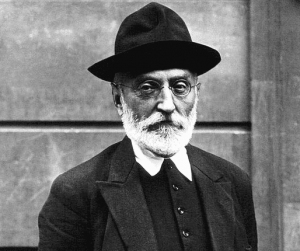Five Sayings of Miguel de Unamuno


Reviewed and approved by the psychologist Gema Sánchez Cuevas
Miguel de Unamuno was a Spanish writer and philosopher who belonged to the so-called Generation of ’98. In his work, we can see how he embraced all the literary genres that exist: novels, essays, poetry, and theater. However, the most characteristic aspect of this author was a predominant theme visible throughout all his work: existentialism.
For this reason, we’ve compiled some of Miguel de Unamuno’s sayings that especially reflect many of the philosophical concerns we see in his writings.
However, before addressing them, it’s a good idea to mention that the existentialism present in Unamuno’s life was a result of the experiences that the Generation of ’98 lived. The political, social, economic, and moral crisis of that time was their source of inspiration. As a result, the anguish of those times is reflected in these writers’ work. Without further ado, we’re now going to look at some of Miguel de Unamuno’s most interesting sayings.

The sayings of Miguel de Unamuno
1. Love makes us believe
“Love makes us believe in God, in whom we hope, and in whom we have the hope of future life; this love makes us believe in what hope’s dream creates in us.”
References to God are prominent in Unamuno’s work. The article “The Desire for God in the Work of Miguel de Unamuno” says that Unamuno sought “A personal God who guarantees immortality and endurance […] and gives meaning to his existence“.
However, with this saying, Unamuno brings us closer to a paradox that he found himself in. On one hand, we have the hope that’s so necessary and so human. Yet, on the other hand, we have the anguish that this hope produces and what he calls a “reverie” or a “dream”.
This contradiction is also reflected in the research that has been conducted on this writer. Researchers still don’t agree on whether he was an atheist, agnostic, or a religious person.
2. The benefits of reading
“The less we read, the more harmful what we read becomes.”
This second saying of Miguel de Unamuno refers to a pastime that’s being practiced less and less these days: reading. Despite its importance, as the article “The Importance and Impact of Reading, Writing, and Critical Thinking in Higher Education” shows, Unamuno, even in his time, already knew how vulnerable people who didn’t read became.
If a person doesn’t read reasonably frequently, then they’re more likely to stop being critical in order to avoid believing everything that comes into their hands. Much of what is written attempts to persuade or convince us. Reading is a way to avoid being manipulated through words.
3. Science teaches us to question
“True science teaches us, above all, to doubt and to be ignorant.”
This third saying is closely related to the previous one. In the same way that a lack of reading can make everything that falls into our hands seem to be true, science teaches us something essential: the art of questioning and doubting.
When we question things or have doubts, this helps us to find the right answers and leads us to greater knowledge. This is very important in the world of science. If we feel ignorant, then that inspires us to continue learning and making discoveries. In fact, the saying of a well-known philosopher, Socrates, may come to mind: “All I know is that I know nothing”.
4. The only advantage of not being happy
“One of the advantages of not being happy is that you can wish for happiness.”
Of all the different reflections in Unamuno’s mind, the idea of being happy was a prominent one. This is a search that we can all identify with. However, it seems to be an unattainable goal, as we never seem to be able to reach total happiness.
This saying of Miguel de Unamuno alludes to the only advantage of not being happy, which is the desire, perhaps hope (as we saw in the first of his sayings), that it won’t remain that way. It’s a longing, however, that never seems to materialize.

5. Not feeling loved is sad
“It’s a sad thing not to feel loved, but it’s much sadder not to be able to love.”
Our last saying of Miguel de Unamuno allows us to reflect on love. Many people seek to feel loved when they don’t love themselves. Cultivating our self-esteem can help us to feel loved, and, by doing so, we can achieve the happiness that we long to attain.
Religion, love, happiness, and doubt are topics that this writer addresses in most of his work. They’re sayings that invite us to reflect. Far from seeming strange to us, they can actually transport us towards the introspection that Unamuno used to frequently immerse himself in.
Miguel de Unamuno is a true figure of reference. In his thinking, we find a reflection of the times he lived in, and we’ve seen that in the sayings we s today. Also, as we’ve seen, these sayings transcend the temporal ubiquity of his life and are projected into history, even today’s history, where they resound with clarity.
All cited sources were thoroughly reviewed by our team to ensure their quality, reliability, currency, and validity. The bibliography of this article was considered reliable and of academic or scientific accuracy.
- García Peña, Ignacio. (2017). El carácter de Augusto Pérez a través de niebla. Alpha (Osorno), (44), 175-196. https://dx.doi.org/10.4067/S0718-22012017000100175
- Maroco Santos, Emanuel José. (2018). Unamuno y la fe religiosa. Eidos, (28), 255-280. Retrieved September 10, 2019, from http://www.scielo.org.co/scielo.php?script=sci_arttext&pid=S1692-88572018000100255&lng=en&tlng=es.
- Posada Gómez, Edward Andrés. (2013). Una fe desesperada: La antropología religiosa de Miguel de Unamuno. Veritas, (29), 97-117. https://dx.doi.org/10.4067/S0718-92732013000200005
This text is provided for informational purposes only and does not replace consultation with a professional. If in doubt, consult your specialist.








